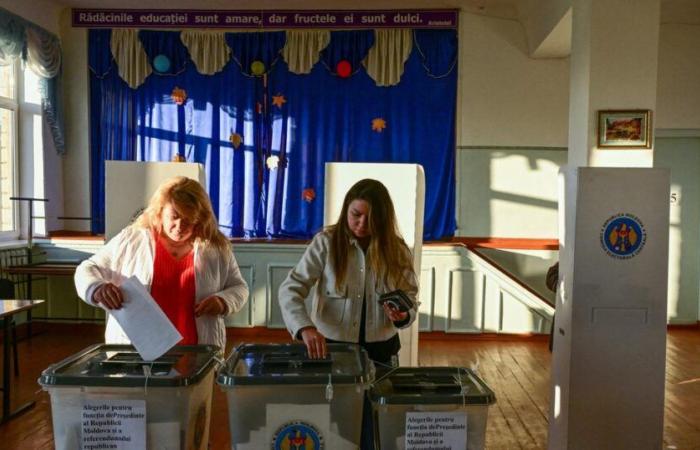After these first results, however, the trend could be reversed as many votes remained to be counted in the capital Chisinau, more favorable to the EU.
The Moldovans, called to vote on Sunday on the inclusion in the Constitution of the objective of membership in the European Union (EU), voted by majority «non»during a referendum organized in the former Soviet republic, according to partial results published by the Electoral Commission.
In a vote clouded by accusations of Russian interference “categorically” rejected by the Kremlin, more than 55% of voters said they were opposed to the inclusion of the European objective in the Constitution, after counting around 70% of the ballots. The trend could, however, be reversed as many votes remained to be counted in the capital Chisinau, more favorable to the EU, and abroad where a large diaspora lives.
Moldova already has a foot in the EU with the official opening of accession negotiations in June. Quite a symbol for this state located between NATO and the Russian sphere of influence, and for a long time torn between the two camps.
Presidential duel
If the no vote prevails, this vote will be a setback for the outgoing head of state Maia Sandu. The 52-year-old candidate came first in the first round of the presidential election with 36% of the votes. On November 3, she will face Alexandr Stoianoglo, 57, supported by the pro-Russian socialists, who did better than expected with nearly 29% of the vote.
She turned her back on Moscow after the invasion of neighboring Ukraine and brought her country’s candidacy to Brussels, calling this referendum to validate her strategy. The first woman to occupy the highest positions in 2020, this former World Bank economist with a reputation for incorruptibility has become a leading European personality in four years.
Facing her, no heavyweight but a string of ten candidates, most of them considered to be more or less linked to Moscow behind speeches of “neutrality”. Some speak Russian, in addition to the official language of Romanian. His rival in the second round, Alexandr Stoianoglo, a former prosecutor dismissed by his rival, had called during the campaign to “restore justice” in front of a power ready according to the opposition to violate rights. Saying he is in favor of a foreign policy “balanced” reconnecting with Russia, he abstained from voting in the referendum.
High participation rate
From the opening of the polling stations, where the national anthem sounded, to the closing, Moldovans responded, including those from the separatist region of Transdniestria, which hosts a garrison of Russian soldiers. “I came to give my voice for the prosperity, peace and well-being of our country”said Olga Cernega, a 60-year-old economist, interviewed by AFP in Chisinau.
Others, like this sixty-year-old lawyer who only wanted to give his first name, Ghenadie, were worried about the turning point «occidental» of Moldova, a loss of identity and judge that the current government “made the situation worse”while part of the population has been impoverished by record inflation.
The participation rate rose to 51.6% for the presidential election, more than four years ago, and almost 50% for the referendum, above the threshold necessary to validate the vote, according to the Election Commission which did not report any major incidents.
Vote buying
Between corruption and disinformation operations, the police have carried out 350 searches in recent months and carried out hundreds of arrests of suspects accused of wanting to disrupt the electoral process on behalf of Moscow. A system “unprecedented” vote buying has been revealed, targeting up to a quarter of voters expected at the polls in the country of 2.6 million people.
“This vote will determine our destiny for many decades”had warned Maia Sandu in the morning. “This is the will of the Moldovan people” who must express themselves, “not other people’s, not dirty money”she insisted. According to the WatchDog think tank, Russia spent around a hundred million dollars to influence the vote. With, in the maneuver, the oligarch Ilan Shor, refugee in Moscow after a conviction for fraud.






